Finding Medicaid-Accepted Eye Doctors: A Comprehensive Guide
Finding an eye doctor who accepts Medicaid can feel like navigating a maze, but it doesn't have to be. This guide will illuminate the path, sharing insider tips and answering common questions to help you find the perfect eye care professional without breaking the bank. Let's begin our journey to clear vision!
My own experience searching for a Medicaid-accepted optometrist taught me the importance of thorough research and persistence. I remember the frustration of calling numerous offices only to be met with disappointment. That's why I'm dedicated to making this process smoother for you.
How to Find Medicaid-Accepted Eye Doctors Near Me?
This is the most frequently asked question, and it deserves a detailed answer. The first step is to leverage the power of online search engines. Use specific keywords like "Medicaid eye doctor near me," "Medicaid ophthalmologist [your city/zip code]," or even "Medicaid-approved optometrist [your county]."
Don't stop there! Many state Medicaid websites offer online provider directories. These directories are invaluable resources; they usually allow you to search by specialty (optometrist, ophthalmologist), location, and even insurance plan. This is where your specific Medicaid plan number comes in handy.
Another effective strategy is to contact your state's Medicaid office directly. Their representatives can provide you with an updated list of providers in your area. They might even have helpful resources or assistance programs you aren't aware of.
Lastly, don't underestimate the power of word-of-mouth. Ask friends, family, or members of your community if they have any recommendations for Medicaid-accepted eye doctors. Personal referrals can be incredibly valuable.
What is the Difference Between an Optometrist and an Ophthalmologist?
Understanding the difference between optometrists and ophthalmologists is crucial when choosing an eye care provider. This often-asked question separates the wheat from the chaff in eye care.
Optometrists are primary eye care providers who can perform eye exams, diagnose common eye problems, and prescribe eyeglasses or contact lenses. They are qualified to manage most routine eye health issues.
Ophthalmologists are medical doctors (MDs or DOs) who specialize in eye and vision care. They can perform complex eye surgeries, diagnose and treat serious eye conditions, and manage medical eye diseases. If you have a complex eye condition or require surgery, an ophthalmologist is the specialist you need. Many ophthalmologists also accept Medicaid, so be sure to check!
Does Medicaid Cover Eye Exams?
Generally, yes, Medicaid covers routine eye exams for both adults and children. However, the specific coverage varies depending on your state and your individual Medicaid plan. Some plans may have limitations on the frequency of exams or require prior authorization for certain procedures. Always check your plan's benefit summary or contact your Medicaid office to confirm your coverage. Don't assume; always verify.
What if My Preferred Eye Doctor Doesn't Accept Medicaid?
Finding an out-of-network eye doctor and still receiving coverage can be tricky, but it's not impossible. Some Medicaid plans offer limited out-of-network benefits, often at a reduced reimbursement rate. This means you'll likely have a higher copay or out-of-pocket expenses. It's important to understand your plan's specific out-of-network coverage before scheduling an appointment with your preferred doctor.
How Often Can I Get My Eyes Examined with Medicaid?
The frequency of covered eye exams varies by state and plan. Some plans may cover annual eye exams, while others might limit it to every two years or even less frequently for adults. Children may have more frequent coverage due to their developmental needs. Again, it's essential to consult your plan's benefit information or contact your Medicaid provider for precise details.
Finding a Medicaid-accepted eye doctor shouldn't be a stressful endeavor. By utilizing the resources and strategies outlined above, you can confidently navigate this process and ensure you receive the quality eye care you deserve. Remember, clear vision is paramount to a healthy life.

